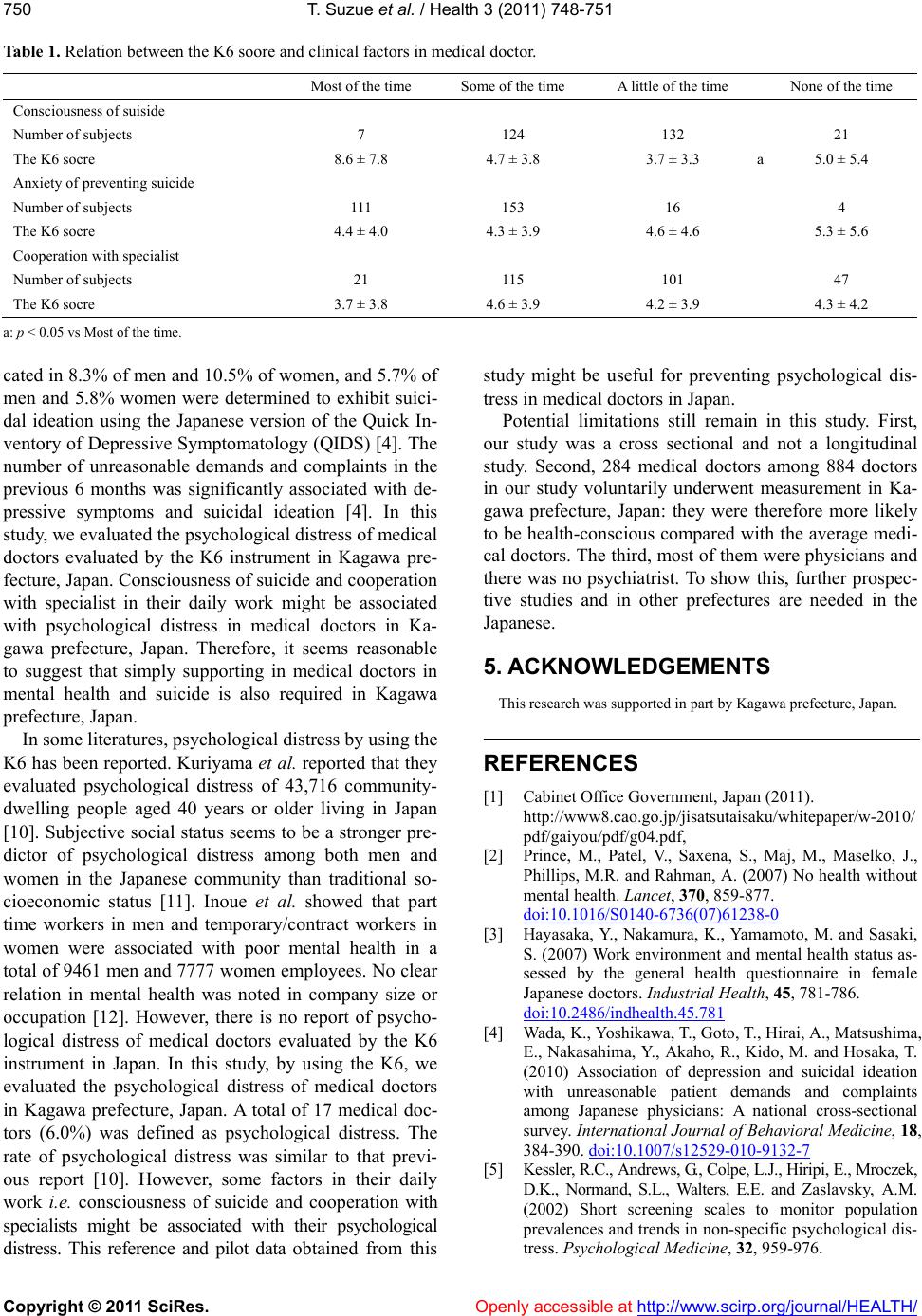
T. Suzue et al. / Health 3 (2011) 748-751
Copyright © 2011 SciRes. Openly accessible at http://www.scirp.org/journal/HEALTH/
750
Table 1. Relation between the K6 soore and clinical factors in medical doctor.
Most of the time Some of the time A little of the time None of the time
Consciousness of suiside
Number of subjects 7 124 132 21
The K6 socre 8.6 ± 7.8 4.7 ± 3.8 3.7 ± 3.3 a 5.0 ± 5.4
Anxiety of preventing suicide
Number of subject s 111 153 16 4
The K6 socre 4.4 ± 4.0 4.3 ± 3.9 4.6 ± 4.6 5.3 ± 5.6
Cooperation with specialist
Number of subjects 21 115 101 47
The K6 socre 3.7 ± 3.8 4.6 ± 3.9 4.2 ± 3.9 4.3 ± 4.2
a: p < 0.05 vs Most of th e time.
cated in 8.3% of men and 10.5% of women, and 5.7% of
men and 5.8% women were determined to exhibit suici-
dal ideation using the Japanese version of the Quick In-
ventory of Depressive Symptomatology (QIDS) [4]. The
number of unreasonable demands and complaints in the
previous 6 months was significantly associated with de-
pressive symptoms and suicidal ideation [4]. In this
study, we evaluated the psychological distress of medical
doctors evaluated by the K6 instrument in Kagawa pre-
fecture, Japan. Consciousness of suicide and cooperation
with specialist in their daily work might be associated
with psychological distress in medical doctors in Ka-
gawa prefecture, Japan. Therefore, it seems reasonable
to suggest that simply supporting in medical doctors in
mental health and suicide is also required in Kagawa
prefecture, Japan.
In some literatures, psychological distress by using the
K6 has been reported. Kuriyama et al. reported that they
evaluated psychological distress of 43,716 community-
dwelling people aged 40 years or older living in Japan
[10]. Subjective social status seems to be a stronger pre-
dictor of psychological distress among both men and
women in the Japanese community than traditional so-
cioeconomic status [11]. Inoue et al. showed that part
time workers in men and temporary/contract workers in
women were associated with poor mental health in a
total of 9461 men and 7777 women employees. No clear
relation in mental health was noted in company size or
occupation [12]. However, there is no report of psycho-
logical distress of medical doctors evaluated by the K6
instrument in Japan. In this study, by using the K6, we
evaluated the psychological distress of medical doctors
in Kagawa prefecture, Japan. A total of 17 medical doc-
tors (6.0%) was defined as psychological distress. The
rate of psychological distress was similar to that previ-
ous report [10]. However, some factors in their daily
work i.e. consciousness of suicide and cooperation with
specialists might be associated with their psychological
distress. This reference and pilot data obtained from this
study might be useful for preventing psychological dis-
tress in medical doctors in Japan.
Potential limitations still remain in this study. First,
our study was a cross sectional and not a longitudinal
study. Second, 284 medical doctors among 884 doctors
in our study voluntarily underwent measurement in Ka-
gawa prefecture, Japan: they were therefore more likely
to be health-conscious compared with the average medi-
cal doctors. The third, most of them were physicians and
there was no psychiatrist. To show this, further prospec-
tive studies and in other prefectures are needed in the
Japanese.
5. ACKNOWLEDGEMENTS
This research was supported in pa rt by Kagawa prefecture, Japan.
REFERENCES
[1] Cabinet Office Government, Japan (2011).
http://www8.cao.go.jp/jisatsutaisaku/whitepaper/w-2010/
pdf/gaiyou/pdf/g04.pdf,
[2] Prince, M., Patel, V., Saxena, S., Maj, M., Maselko, J.,
Phillips, M.R. and Rahman, A. (2007) No health without
mental health. Lancet, 370, 859-877.
doi:10.1016/S0140-6736(07)61238-0
[3] Hayasaka, Y., Nakamura, K., Yamamoto, M. and Sasaki,
S. (2007) Work environment and mental health status as-
sessed by the general health questionnaire in female
Japanese doctors. Industrial Health, 45, 781-786.
doi:10.2486/indhealth.45.781
[4] Wada, K., Yoshikawa, T., Goto, T., Hirai, A., Matsushima,
E., Nakasa hima, Y., Akaho, R., Kido, M. and Hosaka, T.
(2010) Association of depression and suicidal ideation
with unreasonable patient demands and complaints
among Japanese physicians: A national cross-sectional
survey. International Journal of Behavioral Medicine, 18,
384-390. doi:10.1007/s12529-010-9132-7
[5] Kessler, R.C., Andrews, G., Colpe, L.J., Hiri pi, E., Mroczek,
D.K., Normand, S.L., Walters, E.E. and Zaslavsky, A.M.
(2002) Short screening scales to monitor population
prevalences and trends in non-specific psychological dis-
tress. Psychological Medicine, 32, 959-976.